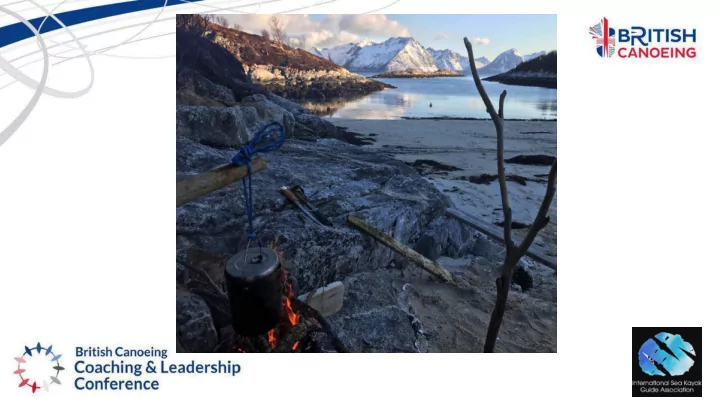

Expedition Skills & Camp craft • This module is aimed at Leaders wanting to expand their knowledge and experience of guiding in their chosen environment. • Aimed at adding value and safety and comfort to your day trips to multi day expeditions in the UK and overseas. • This session is discursive, inter-active, other Leaders will have their own experiences which should also be shared here. • I will share with you my top tips and views to try and offer you a valuable insight to help you to make the most out of journeying with your chosen craft.
Planning an expedition • To journey with a purpose, what is the purpose of your expedition? • Planning: Aim, Factors, Courses Open, Plan • Logistics. What factors do you need to consider: S.H.E.E.T.S • Shared goals & commitments • Equipment, personal, group, • Dictated by the environment ‘No such thing as bad weather, just bad clothing’
Japan Vs South Georgia
Comparatives No two expeditions are the same Japan South Georgia 5000 Miles 350 Miles 139 paddling days out of 180 13 Days 8 Hours Cost £3000-4000 (approximately) £139,000 (approximately) 4 Islands spread across 4 climatic Remote Island in Southern Ocean zones
Please Remember What Comes First • Protection • Rescue • Water • Combustion • Food
Protection • Protection: protect yourself & your group from obvious threats, this can be various: • Weather • Environment • Wild Life • Human • Themselves, moral boosting etc
Rescue • Develop an Emergency Action Plan • Rescue: If the situation necessitates it, instigate your EAP to initiate a rescue: • Flares, VHF’s/Satellite Phones, EPIRB/PLB • Other signaling methods, Mirrors, Fires (day/night), signs, Night sticks, features • Rescue Drills • Follow EAP
WATER Ensuring that suitable drinking water is available for you and the group is vital: • Planning (3-4 liters per day?) • Sourcing • Hazards • Purification methods & safe water drills • Waste management
Combustion • Combustion: Creating fire is a vital wilderness skill, guides require several methods to light fire beyond the naked flame. • Fire triangle, Oxygen, Heat and Fuel • Fire Preparation • Fuel • Ignition • Knife, saw & Axe safety and skill
FOOD Energy Burn 125-lb. person burns 283 calories per hour 150-lb. person burns 340 calories per hour 175-lb. person burns 397 calories per hour 200-lb. person burns 454 calories. Higher body weight requires increased energy expenditure for activity.
Wild Life Our Fur seal bite kit:- • A bottle of Hydrogen Peroxide Solution • A tooth brush • Antibiotics
Hanging a Bear Bag
Loading a sea kayak • DUAL for canoe bags • How to Load the kayak • Deck bags • Use of doubles on expedition • Wing versus Touring blades • Individual equipment • Group equipment • Creature comforts
Points to consider • Maps Vs charts (Pre preg maps with tidal info) • Shared daily goals • Route selection • Selecting your campsite • ERV’s (Pointing out & Going back) • Hard Routine ‘Travel fast go alone, travel far go with others’ • Lost person Protocols
Route selection 4 Elements planning • Wind • Tide • Swell • Climate
Camp Admin • Camp duties • Food management • Waste management • Wildlife encounters
Useful Knots • Stopper Knot • Joining Knot • Hold Fast Knot • Constriction Knot
Stopper knot
Ordinary Prussik
Double sheet bend
Over Hand
Slippery clove hitch
Double Fisherman
Honda Knot
Clove Hitch
Slippery over hand
Highwayman’s Hitch
Round turn two half hitches
Bowline
Minimal walkabout pack - The 5 C’s • Cutting • Combustion • Cordage • Container • Cover
5 10 3 7 9 8 11 6 2 4 19 18 17 28 20 21 12 29 27 1 16 26 22 13 30 24 23 14 15 25
Handy reminder before venturing out • P Plan your route and check met • A Always leave a float plan and EASP • D Deck map, compass, whistle, knife, ouch pouch, repair kit • D Double up small dry bags and link • L Less than 3 should never be • E Equipment – safety, clothing, spares and victuals • R Remember the international distress signal and carry means • S STOP – incident, casualty or change in met
Review • Develop YOUR personal action plan • Consider how this module will affect Your paddling? Your coaching Your students Your clients • Where next?
Recommend
More recommend